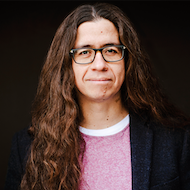
The Waterloo Climate Institute is pleased to announce that Dr. Juan Moreno-Cruz has been appointed Acting Executive Director for a 1-year term. Juan is Associate Professor at the School of Environment, Enterprise and Development (SEED) and the Canada Research Chair in Energy Transitions. He is also a CESifo Research Affiliate.
Moreno-Cruz has been involved with the Waterloo Climate Institute as an Associate Director for the "Deep Decarbonization and Sustainability Transitions" core area since December 2022. He takes on the role as Acting Executive Director as Sarah Burch engages in research and partnerships during her sabbatical year.
The Waterloo Climate Institute, is the focal point for climate change research, training, and knowledge mobilization at the University of Waterloo. The institute is a hub with over 130 researchers from all six University faculties, plus students and scientists from partner institutions and government agencies. The Institute works to elevate and enhance the impact of innovative interdisciplinary research and education that empowers business, government and civil society to respond effectively to the climate crisis. Interdisciplinary platforms hosted by the Institute bring together the research community and partners around strategic research and training priorities advance climate change solutions at the local, national, and international scales.
Institute member expertise and research span three core areas of climate change research:
- Deep decarbonization and sustainability transitions
- Climate science, modelling and observation
- Climate risks, resilience and adaptation
The research also considers critical cross-cutting themes of equity, justice, governance and innovation.
"I am thrilled to serve as Acting Executive Director of the Waterloo Climate Institute. The Climate Institute is uniquely positioned to serve as a boundary institution that invites researchers and community practitioners to collaborate on interdisciplinary projects and climate change research resulting in action toward local, national, and international climate goals.
The Institute accelerates research impact through robust communication and knowledge mobilization strategies. While my role is only transitory, I see this year as full of growth opportunities, continuing the work that Sarah Burch, Simon Glauser and the rest of the team have been doing for the past several years. This year is cementing our capacity for outreach through our training programs such as the Climate Leaders program, the new Graduate Diploma in Climate Change, and new lifelong learning opportunities.
The coming year will also see deeper engagement on climate-related research and community activities, and strengthening partnerships through increased contributions to local, national and international policy debates with our new series on policy and technical briefs. I am most excited about working with a group of colleagues at the Climate Institute who have deep knowledge about climate research, policy, education, training, knowledge mobilization, and a contagious energy and capacity to affect change. We have over 140 Institute members across all six faculties at the University. Please join this momentum, connect with myself or the Institute."
The Institute accelerates research impact through robust communication and knowledge mobilization strategies. While my role is only transitory, I see this year as full of growth opportunities, continuing the work that Sarah Burch, Simon Glauser and the rest of the team have been doing for the past several years. This year is cementing our capacity for outreach through our training programs such as the Climate Leaders program, the new Graduate Diploma in Climate Change, and new lifelong learning opportunities.